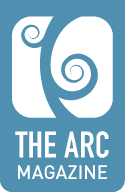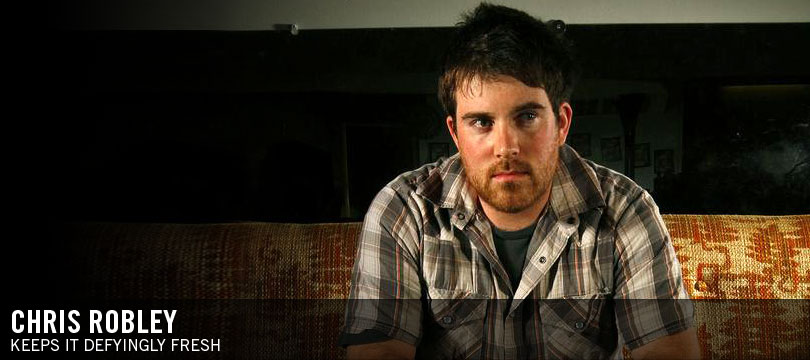
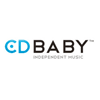
CD Baby is an online record store that sells albums by independent musicians. We listen to every album we sell before we sell it, so we can help you find other albums you'll like. We only sell music that comes directly from the musicians. No distributors. Musicians send us their music. We digitize and warehouse, sell them to you, and pay the musicians directly. Cool thing: in a regular record deal or distribution deal, musicians only make $1-$2 per album, if they ever get paid by their label. When selling through CD Baby, musicians make $6-$12 per album, and get paid weekly. In business, and thriving, since March 1998. We're one of the largest sellers of independent music on the web.
website: www.cdbaby.com
Chris Robley ran into the living room and announced to his parents that he wanted a guitar. He had just listened to a Paul Simon concert on the radio, and he simply had to learn to play. Remembering how quickly he had quit piano lessons, his parents were reluctant to fork out the money for an instrument he’d probably leave neglected under his bed. They decided to compromise and rent him a guitar so that when he lost interest they could just return it to the store.
"I’m left handed at everything I do except guitar, because when we went to rent one no one rented leftie guitars. I was so anxious to start I just took a rightie one and learned that way. But I still air guitar this way," Robley says, pantomiming a left-handed riff.
Fortunately for all of us, Robley never lost interest. Instead, he played jazz guitar in his high school and college jazz bands, and then continued to accumulate musical skills, learning more keyboards and bass and dabbling in other instruments like the banjo, mandolin, and accordion.
Robley and his college friend, drummer John Stewart, got their start playing together in a rock band called the Sort Ofs. It began as a duo but then they recorded an album that somewhat accidentally caused them form a band. Robley says, "We made an album where I went a little crazy and put all kinds of stuff down in the recording. And then we realized that we had to pull all this off live somehow." They enlisted some friends who were also musicians to help fill out the band for live shows.
When Robley decided to start The Fear of Heights, he and Stewart brought in bandmate Rachel Taylor Brown from the Sort Ofs and then built the rest of the band slowly. The band is comprised of other versatile musicians, who play the standard keyboard, percussion, and bass, and also add a rich complexity of sounds using more unexpected instruments like the clarinet, glockenspiel, flugelhorn, and even the kazoo. There’s also a little accordion thrown in for good measure. "Next maybe I’ll do a polka album," he jokes.
Chris Robley and the Fear of Heights has toured with up to 13 people in the band. With all of his bandmates being multi-instrumentalists, stage shows can sometimes be a logistical challenge. "The problem is bringing enough gear so they can switch instruments," Robley explains. "We don’t want to roll into some small venue and have four keyboards and eight guitars. The sound guys do not like that."
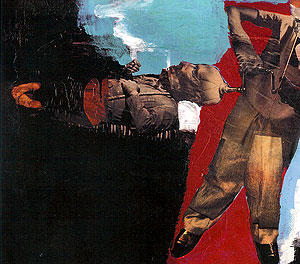 The usual clichés often used to describe music—accessible, complex, diverse—are pretty wimpy given the genius ways the layers of melodies and countermelodies come together. I was hoping Robley could help me out with an "elevator speech" description of his music. "I’m terrible at that stuff," he admits. "If it’s a total stranger I say it’s orchestral indie pop. If they ask for more I’ll usually put ‘folk’ in there because a lot of it is acoustic guitar and people equate that with folk. Let’s just say Beatle-esque."
The usual clichés often used to describe music—accessible, complex, diverse—are pretty wimpy given the genius ways the layers of melodies and countermelodies come together. I was hoping Robley could help me out with an "elevator speech" description of his music. "I’m terrible at that stuff," he admits. "If it’s a total stranger I say it’s orchestral indie pop. If they ask for more I’ll usually put ‘folk’ in there because a lot of it is acoustic guitar and people equate that with folk. Let’s just say Beatle-esque."
The lyrics in the new Chris Robley and the Fear of Heights album, Movie Theater Haiku, move more like poetry or a short story, attesting to the years Robley has spent doing creative writing. With his ambition behind both the music and the lyrics, it can be tricky to put them together without sacrificing the quality of either component. Robley says that when he writes a song he prefers to start with the lyrics. "I find I get into trouble when I write the music first, because I don’t want to change the melody. It takes way longer to fit words that I’m comfortable with to this preexisting melody, whereas I can make up countless melodies to a lyrical phrase."
After touring this spring, Robley is taking a break to finish up a new album, due out this fall. He hasn’t settled on a name for it yet. "It intentionally has no theme. The songs are pretty short and I tried to keep them a little sparser than the previous record. I want to say it’s less ambitious, but to do that, I think, for me it’s more ambitious because my natural tendency is to make things very dense. It’s been an interesting exercise. I wanted to see if I could get away with having the same impact with less."
Making connections
When Robley and Stewart decided to start getting serious about promoting their music, it wasn’t necessarily because they felt ready. It was Stewart’s cousin who helped them round out their focus to include more of a business-oriented mindset—basically, pressing them to do all of the things they dreaded. "When we first moved into town we were totally anti-schmoozing, anti-marketing, anti- anything that wasn’t about being in the basement making music or on the stage making music. John’s cousin was pretty integral in kicking us out the door and saying, ‘You can be as talented as you want, but you have to meet people and make connections and make stuff happen.’" Eventually Robley began to feel more natural doing promotions and connecting with other bands, and now he actually enjoys that part of being a musician.
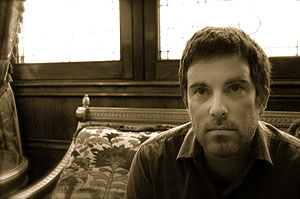 As important as it is to build personal relationships the industry, Robley notes the temptation to use music to power your entrepreneurial spirit. "You should do it because you love making music, rather than because you want attention and just happen to be proficient in this area," he says. When he began to look at different musicians, he found that some approached their music first as a musician and second as an entrepreneur, but others came at it first and foremost as a business. "Those people need to quit and get out of the way. They’re cluttering up the streams," he says, and then adds with a grin, "Okay, that’s the bitter curmudgeon in me coming out."
As important as it is to build personal relationships the industry, Robley notes the temptation to use music to power your entrepreneurial spirit. "You should do it because you love making music, rather than because you want attention and just happen to be proficient in this area," he says. When he began to look at different musicians, he found that some approached their music first as a musician and second as an entrepreneur, but others came at it first and foremost as a business. "Those people need to quit and get out of the way. They’re cluttering up the streams," he says, and then adds with a grin, "Okay, that’s the bitter curmudgeon in me coming out."
As both someone who creates and avidly listens to music, Robley advises musicians to experiment with a wide variety of instruments, and to not limit themselves musically just because a certain instrument isn’t popular. "The trend is to make music where the creative process is constricted by the parameters of what people think is cool. So you can’t have this particular instrument on it, you can’t say something lyrically, you can’t be too melodic. There are all these rules because there’s a trend or a sound that’s en vogue. There’s very little that’s truly unique going on. That bums me out."
On the other hand, Robley acknowledges that musicians are taking a risk when they stray from the tried and true sounds and instruments."If you look at it from a business perspective you might be shooting yourself in the foot and turning people off, but at least let that decision come after you’ve got the initial creative idea developed in some way. I think editing at the end is better than editing up front, or saying ‘we can only do these kind of things’ or ‘we should try to make a song that sounds like that.’" He stresses that taking a unique and interesting approach may be just what listeners need to really latch on to your music. And there’s only one way to find out.
learn more
Website for Chris Robley and The Fear of Heights: www.chrisrobley.com
Purchase the album Movie Theatre Haiku here.
